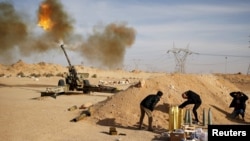Libyans say they are tired of the country’s divisions and the rivalry between competing governments in Tripoli and Tobruk. But politicians are in fear of the armed militias on both sides and privately say it is their ever-shifting grievances and allegiances that are making it hard to pull off a peace deal.
Since the NATO-backed ouster of Libyan strongman Colonel Moammar Gadhafi four years ago, the guns and threats of violence time and again have overwhelmed politics.
For eight months now, this North African country has been locked in a dangerous standoff between the mainly Islamist Tripoli-based government of the General National Congress and the legislature elected to replace it that fled to Tobruk, the House of Representatives (HoR).
The HoR is the internationally recognized parliament.
Reliance on militias
But the rival governments – the Tripoli one also calls itself Libya Dawn – are underpinned by militias, who call the shots as they have done since the ouster of Gadhafi, who was later killed.
Attempts by successive governments, including the National Transitional Council, the first post-revolutionary authority, to demobilize the militias that unseated Libya’s strongman, all ended in failure.
And the militias have grown in number and size.
No one militia or coalition of fighters, however, is able to control the country and that has been demonstrated with the current confrontation between the dueling parliaments and their militia backers.
In an upcoming study by the German research institution Friedrich-Ebert-Stiftung and the Libya Research Center for Strategic and Future Studies, analysts conclude, “No military faction is able to make any territorial gains and end the war in its favor.”
There is plenty of blame to go around.
Ordinary Libyans, especially those who backed Gadhafi, castigate the country’s elite and see the current standoff between Libya Dawn and the internationally recognized power in Tobruk as a power struggle between two factions of the 17 of February Revolution.
Others spot the hidden hand of Gadhafi loyalists behind the current troubles.
“The Gadhafi family has power and money – they are interfering,” says Libya Dawn lawmaker Abdulgader Hwili, who comes from the southern desert town of Sabha.
Old regime loyalists
The old regime’s loyalists certainly have sided with the HoR.
They can be found in the ranks of the forces being commanded by the HoR’s controversial General Khalifa Haftar. Once a Gadhafi loyalist, he later fell out with the dictator.
Omar Tantoush, a former Gadhafi general who fought against the revolution, was recently released by his captors, the militias of Zintan, to fight alongside them on the side of the HoR.
Libya Dawn has made considerable propaganda out of his presence on the battlefield, but Zintan, the hard-scrabble mountain town west of Tripoli, was a key backer of the uprising against Gadhafi.
Labeling the HoR as a reincarnation of the old Gadhafi regime is as inaccurate as dubbing Libya Dawn as Islamist.
The Muslim Brotherhood may dominate the Tripoli-run government, but there are plenty of supporters who are not Islamist – although Tobruk is keen to foster the idea that Libya Dawn is so hardcore Islamist that it is virtually jihadist.
“Do I look like an Islamist?” chuckles the clean-shaven Altaher Mahmed Makni, a GNC lawmaker from the south of Libya and a Tebu tribesman.
Haftar, considered by many even in the HoR camp as a renegade general with ambitions to become Libya’s next strongman, has played up the labeling of Libya Dawn as dangerously Islamist, claiming it is linked with jihadis.
'Fear of terrorism'
Non-aligned political activists in the eastern town of Beida told researchers of the Libya Research Center for Strategic and Future Studies, “Haftar managed to gain the [local] tribe’s support by playing on their fear of terrorism.”
The impasse between Tripoli and Tobruk is not only worrying Libya’s neighbors and the West, but supporters of both camps.
Even in the town of Misrata, a three-hour drive west of the Libyan capital and a hardcore backer of Libya Dawn, there are splits among the powerful militias with fighters complaining that their political leaders are using them, although they fear that Haftar’s Operation Dignity forces are “an opening for Gadhafi’s regime to return to power,” according to Libyan researchers.
“They don’t trust any of the political leaders, neither those of Fajr Libya [Libya Dawn] nor those of Al Karama [Operation Dignity]," the researchers say.
And Misrata militiamen remain furious with Libya Dawn leaders for failing to rush reinforcements and supplies to them in their battle with the jihadis of the Libyan affiliate of the Islamic State group for control of the coastal city of Sirte.
Short on fighters and supplies, Misrata forces had to retreat, allowing the city to be overrun by the jihadis.
The emergence of the Islamic State group in Libya is focusing minds on both sides in the standoff between the parliaments.
There is a growing feeling here in Tripoli that a peace deal between the two could happen, although possibly not via the current U.N.-sponsored political talks.
A growing number of the 136 GNC members still active are ready to back the forming of a national unity government made up of members of both dueling parliaments.
Both Libya Dawn leaders and HoR members, though, express worries privately that they can persuade the militias backing them to accept a deal and HoR members appear to be far more divided with a hawkish group insisting they can agree no compromise with Libya Dawn.
Even those willing to do so say that Haftar is a major obstacle to any political settlement. Could he be given a role in a national unity government?
Most Libya Dawn leaders think not.
“He has a coup mentality,” says Abd Muhammad Qaid, an influential leader in Tripoli.




